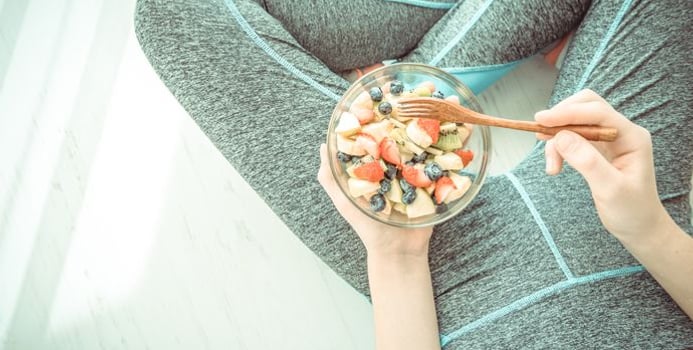If one of your goals this year is to lose weight, you’ve probably read about certain foods to eat or avoid during the course of a day — but what about the time surrounding exercise? Let’s examine the recommendations for what to eat before and after a workout.
Before a workout, the goal is to provide your body with enough energy to complete the exercise. If you don’t eat or don’t eat enough, you may feel sluggish or even lightheaded. Ensuring you eat enough might give you the energy to exercise longer or at a higher intensity. If weight loss is your goal, keep in mind that depriving yourself of food due to dieting or restrictions might result in a mediocre workout.
What should you eat? Carbohydrates are a great energy source. Without carbs, your muscles may not perform as well. Aim to include some complex carbs (whole grain bread, sweet potatoes) so that you will have a steady amount of energy supplied to the muscles. If you only have simple carbohydrates (like sugary sports drinks), you may burn through all the available energy quickly and tire easily. Add a little bit of protein to support your muscles and sustain your energy. Avoid excess fat right before a workout, because fat slows digestion. At this time, you want quick energy.
Pre-workout snack ideas:
- Half of a peanut butter sandwich on whole wheat bread
- 1/3 cup oatmeal with fruit
- A piece of fruit + nut butter (an apple or banana with peanut butter or almond butter)
- A handful of trail mix (mix of nuts and dried fruit — avoid mixes with candy or chocolate)
What about timing? It’s advised to not eat immediately before exercising — this means that, during your workout, your body is using energy to digest food in your stomach. Ideally, all available energy will go towards the muscles you are using. Eating too close to a workout may also cause some gastrointestinal discomfort while exercising. It will take some experimenting to find your best schedule — you may find that eating two hours prior to a workout leaves you hungry at the gym. Try a snack one hour before training, or have a larger amount of food to sustain you. If you’re having a full meal, wait 3-4 hours before strenuous activity.
After a workout, your body needs to replenish calories and fluids lost. Eat a snack or meal as soon as possible, ensuring it has both carbohydrates and protein. A post-workout snack should contain more protein than a pre-workout snack. Carbohydrates replenish glycogen (stored energy) lost through training, but protein helps your muscles repair and build which is crucial after exercising. Keep in mind this is easy to do with food; however, if you are strapped for time, you can try nutritional supplements like shakes, bars, or powders as a replacement for food. Examine the labels to choose one with minimal added sugars and processed ingredients. If you are trying to lose weight, don’t use protein shakes/powders as a snack because they are typically high in calories. These should be used as a meal replacement instead.
Don’t forget fluids! Exercise makes you sweat, so you are losing water that needs to be replaced. If you exercise in the morning, dehydration is a concern because you likely haven’t had anything to drink for 8 hours. Drink water 30-60 minutes before activity. Drink extra water during the summer or during longer sessions. If you're exercising for more than 60 minutes, or at a very high intensity, sports drinks can help replenish electrolytes — check the labels to avoid sugary kinds.
Post-workout snack ideas:
- Greek yogurt with berries and almonds
- Turkey sandwich on whole-grain bread with vegetables



